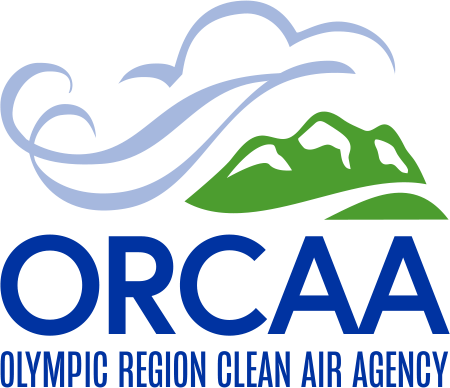Smoke from wildfires has an ever-increasing impact on our lives.
Even if there are no local wildfires threatening our communities, wildfire smoke is frequently transported great distances. In recent years, smoke from fires in Oregon, Montana, British Columbia, and even Alaska has caused elevated levels of air pollution in ORCAA’s jurisdiction.
Note that any smoky air can be dangerous. According to Washington State Department of Health (DOH), taking steps to protect your health is important for everyone, especially for:
- pregnant women
- people over 65
- babies and children
- those with heart or lung diseases.
Symptoms of Wildfire Smoke Exposure
Breathing wildfire smoke can cause or worsen health problems. Some symptoms of breathing including:
- burning eyes
- sore throat
- headache
- coughing
- wheezing
- shortness of breath
- worsening heart and lung conditions
Contact your health care provider if you have heart or lung problems when around smoke. Call 911 if you or someone else has serious symptoms—like trouble breathing.
Limit Exposure to Smoky Air— Who’s most at risk?
When smoke levels reach the “unhealthy for sensitive groups” category, people with heart or lung diseases, pregnant women, people over 65, and babies and children should limit time outdoors and keep indoor air clean. If air quality worsens and smoke levels reach “unhealthy,” “very unhealthy” or hazardous” categories, everyone should limit their time outdoors, avoid exercise outdoors, and take steps to keep indoor air clean. Check outdoor air quality for your area on the ORCAA air monitoring page, or on the Department of Ecology interactive map page. During wildfire smoke episodes, check Burn Portal – WA DNR and the Washington Smoke Blog.
Video
Instructions on building a Do it Yourself (DIY) room air filter using box fans and furnace filters.
Keep Indoor Air Clean
Close windows and doors, but be mindful of the heat and stay hydrated to avoid other health problems. Use fans indoors, and if you have an air conditioner, set it to recirculate. Use a HEPA air cleaner. Don’t add to indoor air pollution; avoid using candles, and don’t smoke or vacuum while it’s smoky outside. For proven strategies for helping improve indoor conditions during smoke events, see our recent blog post here.
Monitor the Quality of Your Air
Some people, including people with heart or lung disease, pregnant women, people over 65, babies and children are at higher risk of problems from breathing smoke. It’s especially important for these people and those who care for them to pay attention to air quality and take steps to reduce their exposure to smoke. Washington Smoke Blog provides the latest information on current air quality conditions and smoke forecasts so you know what to expect.
For more information on what you can do to stay healthy this wildfire season, visit the Washington State Department of Health Smoke From Fires website.

